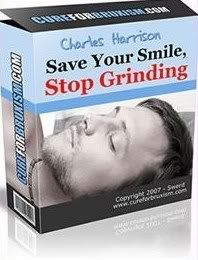Many people wish they could stop grinding teeth at night while they are asleep. This is not easy to do as most people don't even know they are doing it! So how do you stop something like teeth grinding when you are not awake to know it is happening?
If you can work on fixing the problem yourself, then you will not need the expensive mouth guard your dentist is trying to sell you. In order to stop bruxism, you will have to train yourself not to do it. Now this is easier said than done and it cannot be done overnight. Well, maybe if you try hypnotism to stop your teeth grinding it can be stopped immediately but I have never tried that strategy.
The ebook "Save your Smile, Stop Grinding" is about natural cures for putting an end to your teeth grinding forever. It has been designed to stop all types of teeth grinders ranging from simple stress related grinding, to the most advanced teeth grinders who have had this disorder their teeth their whole life.
This book offers a step-by-step, fully illustrated program that reveals how to cure bruxism in just minutes a day and has been written about in the New York Times. With the purchase of the book you will also get unlimited to the members area for life. This is an ebook (electronic book) which you can download within seconds of paying online and be learning the valuable information within about how to stop grinding teeth at night.
Your Dentist Will Spot a Teeth Grinding Problem
Do you ever wake up in the morning with a sore mouth or jaw? Bruxism is the medical term for grinding teeth or jaw clenching, especially during sleep or while under stress. When a person grinds down their front teeth, the upper and lower jaw get closer together which gives a haggard appearance to the face when the mouth is closed.
Bruxism is a stress symptom that often has a major impact on dental health. People who have otherwise healthy teeth and gums can clench so often and so hard that over time their teeth become sensitive and they experience jaw pain and headaches.
Bruxers are often unaware that they have developed this habit of grinding teeth and, often have no idea that treatment is available until damage as already been done to the mouth and teeth.
Your dentist can best spot signs of bruxism in your mouth and jaw with regular visits and examinations. Talk with your dentist if you suspect that you are grinding your teeth. Bruxism is the involuntary, nervous teeth grinding while a patient is asleep and your dentist is best suited to spot evidence of this problem.
Grinding teeth is often not a major problem but sometimes it can be frequent and severe enough to lead to jaw disorders, headaches, damaged teeth and other problems. Muscle relaxants or botulism toxin may temporarily ease spasm in clenched and overworked jaw muscles when more conservative treatments fail. A nightguard is NOT a solution, rather a method of greatly decreasing the damagecaused by bruxing. The mouth guard that your dentist might suggest will not cure you of your teeth grinding. It only serves as a bandaid to cover up the problem and protect your teeth. It is best to try to uncover the source of the problem and eliminate your damaging habit of grinding teeth.
Bruxism is a stress symptom that often has a major impact on dental health. People who have otherwise healthy teeth and gums can clench so often and so hard that over time their teeth become sensitive and they experience jaw pain and headaches.
Bruxers are often unaware that they have developed this habit of grinding teeth and, often have no idea that treatment is available until damage as already been done to the mouth and teeth.
Your dentist can best spot signs of bruxism in your mouth and jaw with regular visits and examinations. Talk with your dentist if you suspect that you are grinding your teeth. Bruxism is the involuntary, nervous teeth grinding while a patient is asleep and your dentist is best suited to spot evidence of this problem.
Grinding teeth is often not a major problem but sometimes it can be frequent and severe enough to lead to jaw disorders, headaches, damaged teeth and other problems. Muscle relaxants or botulism toxin may temporarily ease spasm in clenched and overworked jaw muscles when more conservative treatments fail. A nightguard is NOT a solution, rather a method of greatly decreasing the damagecaused by bruxing. The mouth guard that your dentist might suggest will not cure you of your teeth grinding. It only serves as a bandaid to cover up the problem and protect your teeth. It is best to try to uncover the source of the problem and eliminate your damaging habit of grinding teeth.
Subscribe to:
Comments (Atom)
